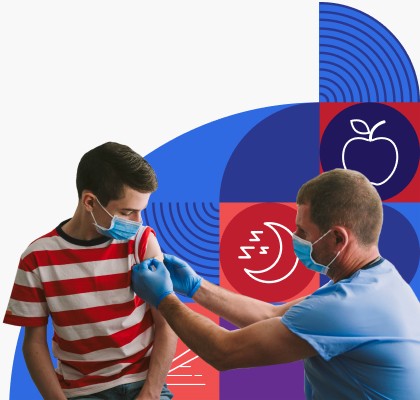
The Basics: Overview
Vaccines (also called shots or immunizations) help protect children from serious diseases. Getting your child vaccinated also protects other people in your community who may not be able to get vaccines.
Making sure your child gets all recommended vaccines by age 2 will help protect your child from diseases that can be dangerous or even deadly, including:
- Measles
- Whooping cough (pertussis)
- Chickenpox
- Hepatitis A and B
Keep in mind that the Centers for Disease Control and Prevention (CDC) also recommends that children age 6 months and older also get vaccinated against COVID-19. Learn more about COVID-19 vaccines for kids and teens.
It’s important for your child to get all recommended vaccines.
Each vaccine protects your child from different diseases. And each vaccine usually requires more than 1 dose. For the best protection, your child needs to get every dose of each vaccine. If your child misses a dose, they may not be protected.
It’s important for every child to get vaccinated.
Thanks to vaccines, many serious childhood diseases that used to be common are now rare. But the bacteria and viruses (germs) that cause these diseases are still around.
Each child who isn’t vaccinated can get sick themselves — or spread those germs to other people.
When does my child need these vaccines?
Vaccines work best when children get them at certain ages. Doctors follow a schedule for vaccines that begins at birth.
- Use this parent-friendly vaccine schedule to find out when kids age 6 or younger need vaccines
- If you think your child may have missed some vaccines, talk to the doctor about “catch-up” vaccines
- Doctors recommend that pre-teens ages 11 and 12 get important vaccines, too — find out more about vaccines for pre-teens
Ask the doctor for a list of the vaccines your child has gotten. Keep the list in a safe place — you’ll need it for school and other activities. Kids who aren’t up to date on their vaccines may not be allowed to go to certain schools.
The Basics: Safety and Side Effects
Are there any side effects from these vaccines?
Side effects from vaccines are usually mild and go away after a few days. The most common side effect is pain or redness where the shot was given. Some children don’t have any side effects at all.
Vaccines are very safe.
Vaccines go through a careful testing process before doctors start giving them to people. Also, CDC and the Food and Drug Administration (FDA) continue to track vaccines to make sure they’re safe. The chance that a vaccine will cause a serious problem is very small.
Vaccines don’t cause autism.
Autism is a brain disorder that can cause social, communication, and behavioral issues. For example, kids with autism may have trouble talking and connecting with other people.
Some people have worried that autism could be linked to childhood vaccines. But many studies have shown that vaccines don’t cause autism.
To learn more about kids and vaccines, read these answers to common questions.
Take Action: See a Doctor
Protect your child from serious diseases by making sure they get all recommended vaccines.
Find out which vaccines your child needs.
Check with your child’s doctor to make sure they’re getting all recommended vaccines. Use this tool to find out which vaccines your child may still need.
Get your child a seasonal flu vaccine every year.
Everyone age 6 months and older needs to get the seasonal flu vaccine every year.
You may not even need to make an appointment to get your child the yearly flu vaccine. You can get a flu vaccine at a health clinic, pharmacy, or your local health department.
If you’re not sure where to start, call your child’s doctor or your local health department.
Tell the doctor about bad reactions.
Serious side effects after getting a vaccine — like a severe allergic reaction — are very rare. If your child or another family member has had a bad reaction to a vaccine in the past, tell the doctor before your child gets a vaccine.
Pay extra attention to your child for a few days after they get a vaccine. If you see something that worries you, call your child’s doctor.
Take Action: Cost and Insurance
What about cost?
Under the Affordable Care Act, insurance plans must cover recommended vaccines for kids. Depending on your insurance plan, you may be able to get your child’s vaccines at no cost to you. Check with your insurance company to find out what’s included in your plan.
Your child may also qualify for free or low-cost health insurance through Medicaid or the Children’s Health Insurance Program (CHIP). Learn more about coverage options for your family.
If you don’t have insurance, you can still get your child’s vaccines:
- Find out if your child qualifies for free vaccines
- Find a free or low-cost vaccination program in your state
- Find a health center near you and ask about vaccines
To learn more, check out these resources:
Take Action: Make Vaccines Less Stressful
Help make the vaccine visit easier for your child.
During your child’s vaccine visit, make sure to:
- Stay calm
- Ask the doctor or nurse for tips on how to hold your child during the shot
- Distract your child during the shot — like telling a joke, singing a song, or pointing to a picture on the wall
- Praise your child after the shot is over
Get more tips on making shots less stressful for you and your child.
